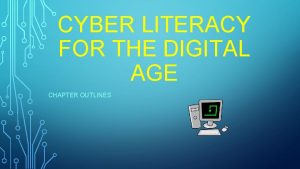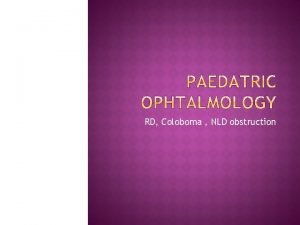UROP Undergraduate Research Opportunities Programme Undergraduate digital literacy

- Slides: 1

UROP Undergraduate Research Opportunities Programme Undergraduate digital literacy in employability, teaching and learning | Mitchell, D. | Lloyd-Evans, S. | Musson, S. | Project Outline: Summary of Findings: #digitalliteracy #factsandfigures Digital literacy can be defined as the ability to use and understand information that is communicated through digital technology. Digital literacy involves having a working knowledge of technology and a good understanding of how it can be used and deployed. This qualitative research project aims to explore the digital literacy skills, experiences and expectations of current undergraduates at the University of Reading in the School of Archaeology, Geography and Environmental Sciences. We sought to understand whether students are readily prepared to deal with the evolving technological world of work and how the University might further support students in becoming digital. Research Methodology: we conducted a review of current University practice, interviewed 12 key staff in SAGES and the University; undertook an online questionnaire survey with 150 second and third year students in the School; trialled the use of Twitter in two Geography modules to communicate with students and conducted follow-up focus groups with students. Focus Groups: #studentssay Geography: • 100% of students use Facebook, 70% use Twitter and nearly 50% would like to use Linked. In • 79% say digital literacy skills are as important as Literacy and Numeracy Skills Environmental Sciences: • 100% say they have never received advice or training on how to use sites such as Facebook, Twitter, Linked. In, Blogs etc. for a professional purpose. 92% would not be very confident if their social media profiles were checked and would like to know what companies are looking for • 100% want more departmental interaction with social media, 67% would like more accessible information on Blackboard and 50% would like a Facebook page for extra information and an easier way of communicating Archaeology • 94% say they have never received any advice or training on how to use sites such as Facebook, Twitter, Linked. In, Blogs etc. for a professional purpose • 68% want more departmental interaction with social media. 61% say digital skills are as important as literacy and numeracy skills What students want*: #outwiththeoldandinwiththenew A better Facebook page 43% Hearing from Alumni Students 51% Linked. In Training Class 44% More accessible information on Blackboard 66% Staff Twitter Profiles 37% Hearing from current students 54% “The University hasn’t covered online safety at all” “Social media is becoming a personal professional platform and where the line is drawn between the two is constantly fluctuating” University Context: #staffviews “Newer forms of Digital Literacy are important and should be used” *Taken from a questionnaire with 150 participants. • Better Digital Literacy enhances student’s employability skills, particularly Linked. In • Staff need social media training to better support students in teaching and learning • Emails aren’t always the most effective method of communicating with students What next? “We need to maximise the potential of Social Media across campus” • Departmental Facebook and Twitter pages are not consistent across the University • Develop new University-wide guidelines and enhance the ‘Being Online’ page • Educate staff and students on using these sites effectively, securely and safely “Improve online training and capture experiences of the Uo. R Alumni” • Invite Alumni students to discuss how they created a positive online presence • Offer interactive workshops on Linked. In for students professional development • Utilise the concept of blogging for students and departments online presence A blog was also kept on this project, so if you want to find out any more information, you can visit http: //blogs. reading. ac. uk/digitallyready/. This project was part of the University’s Digitally Ready Project. #thefuture 1. This project is ongoing and results need to be analysed further 1. Feedback to University, CPEC and SAGES in Spring 2014 1. Introduce plans for enhancing the online presence of staff and students This project was supported through the University of Reading UROP (Undergraduate Research Opportunities Programme). UROP is managed by the Careers, Placement and Experience Centre.

